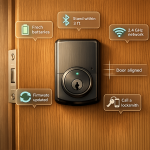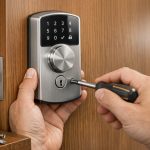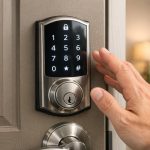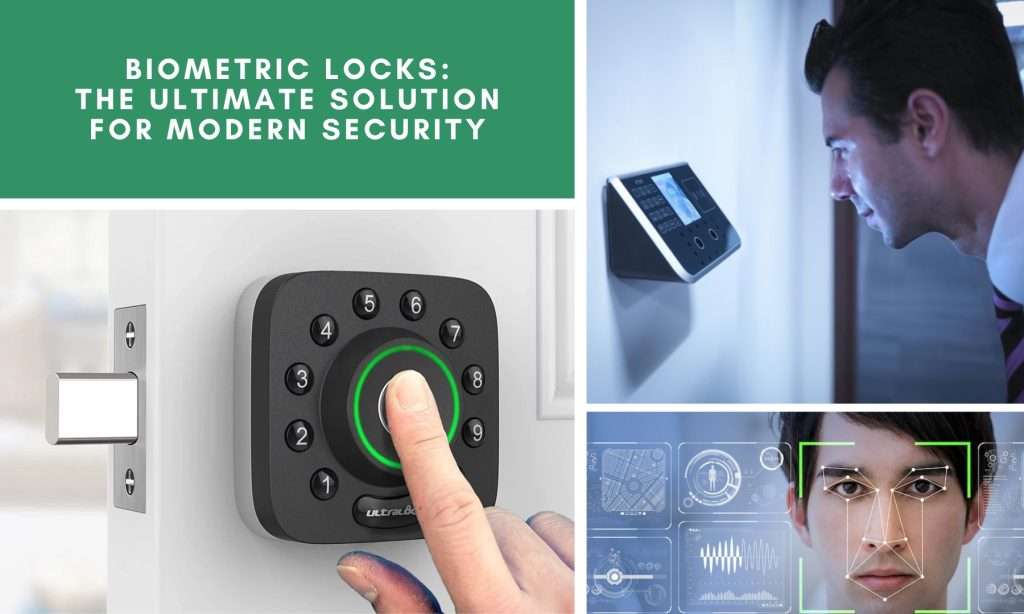There has never been a greater need for strong and creative security solutions than now when security concerns are high and technology is always changing. Locks and keys used to be the most reliable way to keep people safe, but more and more complex threats are showing them to be inadequate. Fortunately, biometric locks have entered the picture as one of the best ways to keep properties safe. Come along with us as we look into the future of security, where your identity is the key.
Understanding Biometric Locks
Biometric locks work by using unique physical or behavioral features to control who can enter or exit. When someone tries to enter, the lock scans and records their biometric identifier, like a fingerprint. This data is then converted into a digital format and compared with the stored templates in the lock’s database. If the scanned data matches a registered user’s template, the lock opens, allowing entry.
Role in Enhancing Security
Biometric locks have changed how we handle security by offering different and more advanced ways of access control. Unlike traditional locks that require keys or codes, these locks use unique physical and behavioral traits to grant or deny access. That way, it gets rid of the risk of lost or stolen keys. Because biometric IDs are hard to copy, it also adds an extra layer of security.
As technology improves, biometric lock systems are also changing. They now use encryption, machine learning algorithms, and real-time tracking to stop hackers and unauthorized people from getting in. As the world becomes more connected, these locks offer a smooth and adaptable solution to keep up with ever-changing security needs. That makes them an important tool for protecting homes, businesses, and high-security facilities.
The Benefits of Biometric Locks
Biometric locks have a lot of benefits that make them a game-changer for controlling access in homes and businesses. By using unique physical or behavioral traits, these locks offer the highest level of security, making unauthorized entry almost impossible. Plus, they make things easier because you do not need keys or remember any passwords. All you need is a quick scan of your finger or face, and you are in.

These modern locks also keep track of who comes in and out, which is great for knowing who accessed your space and when. You can even customize and update these locks, making them suitable for a wide range of security needs. What is great about this lock is that it aids in touchless entry, which is more hygienic. Another plus is the ability to control access in real-time, keeping your security right up to date. With all these features, biometric locks are leading the way to modern security solutions.
Types of Identifiers Used in Biometric Locks
Biometric identifiers in locks include different physical and behavioral traits. Each one provides a unique and very safe way to control entry. A few examples are:
Fingerprint Recognition
This method relies on the unique ridge patterns and tiny points on each person’s fingers.
Iris Scanning
Iris recognition relies on the complex patterns found in the human eye. These patterns are unique and stay the same over the years.
Facial Recognition
Facial biometrics use unique traits of the face, like the space between the eyes, nose, and mouth, to identify people.
Voice Recognition
For identification, voice biometrics look at a person’s pitch, tone, and speech habits, among other things.
Palmprint Recognition
Palmprint technology uses the unique lines and shapes on each person’s palm, just like fingerprint technology does.
Gait Analysis
Gait biometrics look at how someone walks, including the length and time of their steps, to identify them.
Real-World Applications
Biometric locks find a wide range of real-world applications across various industries and settings. Here are some well-known examples:
Residential Security
More and more houses are using biometric locks, which make controlling access easy and safe. People often put them on front doors, safes, and private rooms.
Commercial Buildings
Many businesses use biometric locks for office entry points, meeting rooms, and secure areas to control access to sensitive information and assets.
Hotels
Often used in hotels, biometric locks make them safer and more convenient for guests. Guests can use their fingerprints or other biometrics to get into their rooms.
Airports and Transportation
Airports and transportation hubs use biometric locks and access control systems to keep people safe in restricted areas like airline crew areas and baggage handling zones.
Data Centers
Data centers require strict security measures. Biometric locks keep people from getting into computer rooms and data storage areas, which keep private data safe.
Healthcare Facilities
Biometric locks are also useful in healthcare situations to protect patient privacy and safety by locking down areas that store medical records.

Education Institutions
To make campuses safer, schools and colleges use biometric locks to lock classrooms, dorms, and administrative offices.
Government and Military
Biometric locks are very important in military and government buildings to keep secret information and restricted areas safe.
Financial Institutions
Banks and other financial institutions use biometric locks to protect vaults, ATMs, and other important infrastructure.
Manufacturing and Industrial Facilities
In factories and other industrial settings, biometric locks are used to keep machinery, inventory, and dangerous items safe.
Retail Stores
Stores use biometric locks to keep stockrooms, areas where they store goods, and cash-handling areas safe.
The Future Trends in Biometric Locks
Biometric locks will probably change in the future as new technologies come together with changing security needs. For example, multiple biometric identifiers, when used together, make things more accurate. Also, ongoing authentication will change based on how the user acts and the use of AI and machine learning will make things more secure.
Wearable biometrics, cloud-based management, and integrating IoT are also going to change the way we control entry. Privacy and data security, along with customization and scalability, will stay as the most important considerations. As the field develops, biometric locks will remain an important part of making sure that access to many places and systems is safe and easy.
Locksmith Near Me
Are you looking for a secure and convenient way to safeguard your property in Pittsburgh, PA? Look no further than Sherlock’s Locksmith. With cutting-edge biometric lock installation, our professional team is ready to take your security to the next level and make sure your home or business is safer than ever. We can help you with any kind of locksmith service, whether you want biometric locks or something else. Do not risk your safety; call Sherlock’s Locksmith at (412) 960-1250 right now, and let us give you peace of mind. Your safety is our top concern!









